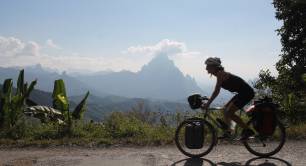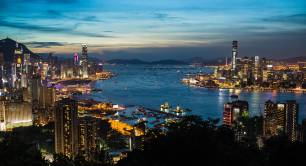In search of social enterprise in Myanmar, India and Nepal
In part two of their photo diary, Katie Moss and Joseph Thomas complete their 10,000km purpose-driven, human-powered expedition from Vietnam to Nepal. In this second leg, they begin in Myanmar, travel through north-east India and finish in Nepal, visiting social enterprises that focus on gender equality and climate change.
Have you ever thought about leaving your job to raise awareness of social enterprise whilst cycling 10,000 km? We decided to do just that through our project Gearing Up. On our journey cycling from Vietnam to Nepal we explored social enterprises that work in two fields: gender equality and climate change. Read the first part of our photo diary here.
(Note: Katie and Joseph's journey was carried out before the recent Rohingya crisis in Myanmar.)
Our first evening in Myanmar truly highlighted the rapid changes and development that the country is undergoing. The small town of Kawkereig, in south-east Myanmar, only has electricity from 6pm to 11pm, but picking up a 4G sim card could not have been easier. The country has witnessed the fastest uptake of smart-phones in the world: by 2016, 90% of the country had access to a mobile phone, from only 12% in 2013. Even at the spectacular Shwedagon Pagoda, we got very used to having selfies with young Burmese teenagers. In this photo Katie is wearing a longyi, the traditional Myanmar dress, bought from the social enterprise Hla Day, which works with Myanmar artisans, disadvantaged groups and small local businesses to produce beautiful hand made products. All profits are reinvested to empower its community of producers.
We met Bikes in Ygn (above) at Yangon University, a group of young graduates encouraging Burmese students to start cycling and for government officials to consider cycling as a viable option for Yangon city planning. They have received a Young South-East Asian Leaders Initiative Seeds for the Future grant to establish a bike sharing programme on the university campus. Yangon University has had a tumultuous history as the centre of student demonstrations in the country. Myanmar’s military regime suppressed a student demonstration at the University in 1962 which resulted in the deaths of possibly hundreds of students. The next day the student union building was dynamited. The university is a fitting place for a student-led movement to get more people cycling, especially as the student union is due to rebuilt this year and students are beginning to feel able to raise their voices again.
Myanmar is already witnessing the devastating effects of climate change, for which it is tragically not prepared. In 2008, cyclone Nargis killed 140,000 people and caused over $10 billion of damage. An international response was held up by red tape for many days after the event. Although one of the smallest global contributors to carbon emissions, the country is in an excellent position to benefit from recent developments in renewable energy. With two-thirds of the country without electricity in their homes, and the price of solar panels falling at 10% per year around the world, Myanmar should capitalise on the opportunity to provide clean energy to its citizens. (Above: Rush hour in Yangon.)
SELCO Foundation supports entrepreneurs across India to develop sustainable energy enterprises delivering solutions to marginalised or underserved communities. Similarly to Myanmar, north-east India significantly lacks basic infrastructure and getting access to electricity can transform livelihoods. In Manipur we met Dev, whose company, Mangaal, provides solar systems to households without electricity. Later in our journey we visited another organisation supported by SELCO, MOSONiE (pictured above), meaning ‘common wealth’ in the Mao language. It works with some of the country’s most neglected villages. Since technically these villages lie within the state of Meghalaya, Assam’s state government will not take responsibility for their livelihoods. But as it lies within disputed territory, the Meghalaya state government is not interested either. As a result, there are no government schools, no electricity and no prospect of a meaningful livelihood. One part of MOSONiE’s mission is to install solar home systems to families without power, with favourable payment plans.
States in north-east India refer to the rest of India as the ‘mainland’, partly because they consider themselves cut off, but also because they see themselves as different. Many people of the north-east Indian state, Nagaland have been fighting for sovereignty from the Indian government for decades. It is a state composed of 16 tribes; each tribe has its own language, dress and culture (representatives of the Ao tribe are pictured above at the Women's Association annual meeting). Ninety per cent of the Nagamese are Christians (whereas 80% of Indians are Hindu), something that became quickly apparent. Churches were the most prominent buildings in every town and village we approached, but this quickly changed as we cycled across the border to Assam and were immediately met by women on their way to work at the tea plantations in beautifully colourful saris.
Warmshowers is an online community similar to Couchsurfing but for cyclists. Our Warmshowers host, Sievituo Solo, in Kohima, Nagaland, also happened to have founded the town’s youth and community participation initiative and now social enterprise, Project 72 Hrs. As we arrived into Kohima, we had stopped to have a look at a street art mural of successful people who had all come from humble beginnings (including Michael Jordan, JK Rowling, Eminem and Che Guevara) – this turned out to be part of Project 72 Hours’ street art initiative to inspire young people to believe anything is possible. It all started with the idea of collective action: for young people to dedicate 72 hours of their year to clearing up rubbish in the streets, but now the local authorities are employing Project 72 Hrs and his team to paint walls and create art installations around the town.
Education, and a severe lack of affordable (or free) high quality education has unfortunately been a common theme throughout this journey. In all the countries we have cycled through, a rote learning education system still remains, and students struggle to develop critical thinking or analytical skills. Coupled with a dominantly hierarchical social structure, students are not taught to question their elders, or teachers or to take risks. Karkhana, based in Kathmandu, is an extra-curricular education company which creates learning experiences to teach ‘21st century skills’ to complement the traditional education system in Nepal, namely critical thinking, creativity, collaboration and communication. Here schoolchildren take part in a World Environment Day parade in Kathmandu.
Nepal remains a strongly patriarchal society, so although the gap is closing, significant gender inequality remains, particularly in poor, rural areas. It is estimated that 12,000 Nepali women and girls are trafficked into India every year and sold into a life of prostitution. Families in vulnerable and difficult economic circumstances hear of opportunities for their daughters to work as domestic helpers in the cities, and sell their daughters to a broker who then takes them out of the country. Economic opportunities for women in Nepal are limited and in rural areas they are less likely to be sent to school than their brothers. Single women are particularly vulnerable and without any financial support, they can often find themselves without any viable means to support themselves and their children. Ram Kali (pictured above) recognised the plight of single women in Nepal and in 1975 created the Women's Skills Development Organisation to provide viable employment opportunities and training, in this case weaving and sewing. The organisation currently employs over 500 women, creating some wonderful homemade products sold in their shops in Pokhara.
Nepal is highly dependent on its tourism industry, which makes it all the more important that the tourism industry abides by sustainable practice, such as protecting and conserving the natural environment that tourists come to appreciate. In the trekking regions of the country, vital steps have been taken, for example, to reduce deforestation and instead encourage the installation of solar heaters. The demand for responsible tourism ultimately comes from tourists themselves, and organisations such as Community Homestay are meeting that demand by connecting travellers with community based homestay projects, which aim to empower local communities by generating local economic opportunities whilst travellers learn about the traditions and cultures of rural communities. As we walked around Barauli village, near Chitwan National Park, we talked to this family who were preparing sweets for their daughter's wedding the following day.

One of the most successful social enterprise models we continually found across the continent are training restaurants and cafes, which provide training and employment to vulnerable or marginalised people who would otherwise have limited opportunities to generate an income. They are also a viable income-generating business for local NGOs. One of the most famous and earliest of these models is KOTO, in Vietnam. Cities such as Phnom Penh and Siem Reap in Cambodia have a number of these cafes, catered towards coffee- and cake-loving tourists, whose money also goes that bit further. We talk about this model and how it can be developed in a video presentation we gave to the Social Enterprise South-East Asia inaugural conference in Phnom Penh in May 2017.
Follow Gearing Up on Facebook, Instagram and Twitter.




